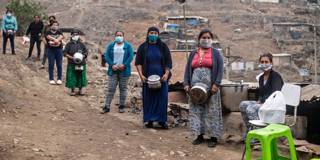The latest update to the global Multidimensional Poverty Index shows that many countries have made significant progress in improving the lives of the poor over the past decade. Rather than allow these gains to be reversed by the COVID-19 pandemic, governments must seize this moment to redouble their efforts.
OXFORD – Today’s pandemic-induced humanitarian and economic crisis represents an unprecedented opportunity to go beyond emergency responses and address our economies’ structural flaws. Many governments’ stimulus and recovery packages are already shaping the future. But leaders across all sectors of society should recognize this moment as a rare chance to build a more inclusive and sustainable world, which will be possible only if we end poverty in all its forms.

OXFORD – Today’s pandemic-induced humanitarian and economic crisis represents an unprecedented opportunity to go beyond emergency responses and address our economies’ structural flaws. Many governments’ stimulus and recovery packages are already shaping the future. But leaders across all sectors of society should recognize this moment as a rare chance to build a more inclusive and sustainable world, which will be possible only if we end poverty in all its forms.